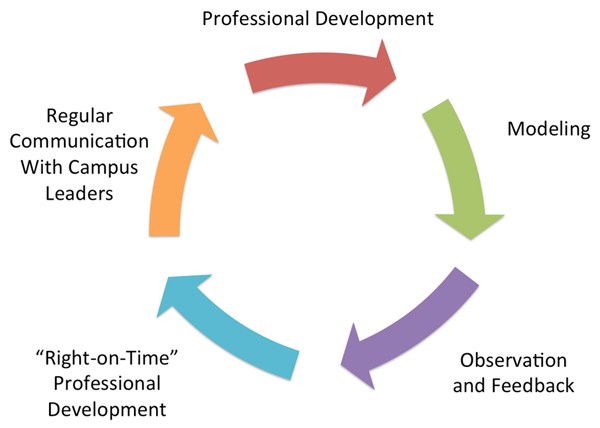As you learned in the previous lesson, instructional leadership is key to any campus improvement efforts. When schools work to build capacity among staff and have systems in place to support instructional leadership, teachers receive systematic and consistent support in their professional growth.
Another way to ensure strong instructional leadership is through an effective instructional coaching model. The Texas State Literacy Plan (TSLP) directs schools to adopt and implement a coaching model to support evidence-based literacy practices and aid in the improvement measures outlined in your campus’s data-informed plan for improving literacy instruction. As Joyce and Showers (2002) have noted, “A large and dramatic increase in transfer of training occurs when coaching is added to an initial training experience comprised of theory explanation, demonstrations, and practice” (p. 77).
In other words, professional development should be comprised of job-embedded support for teachers, meaning professional development “situated in schools that is always about the current work of schools” (Croft, Coggshall, Dolan, & Powers, 2010, p. 5). As part of this type of professional support, literacy coaches facilitate teachers in learning evidence-based practices and incorporating them into their regular instruction.
This section will describe the job of the literacy coach, along with recommended guidelines, roles, and qualifications. If your campus has not planned to hire coaches this year, you and your leadership team can use the information in this lesson in your efforts to build capacity at your campus. You may integrate the actions described here into the roles of the instructional leader(s) currently identified at your campus. Also, you may use what you learn in this section as you think about hiring a literacy coach at a future time.
Effective coaches are knowledgeable and experienced lifelong learners who foster and maintain a sense of trust and rapport with teachers. They provide supportive guidance that is confidential and based on professional ethics. From the outset, the campus-based leadership team needs to stress confidentiality between the coach and teacher (Center on Instruction, 2008).
As an instructional leader, the coach provides support, mentoring, and assistance to all classroom teachers in the full and skillful implementation of the literacy program. The coach serves as a resource for identifying appropriate instructional strategies and interventions to address the needs of diverse student groups (i.e., English learners, students with dyslexia, students at risk for literacy difficulties, and students in special education) and to improve all students’ achievement.
The coach observes instruction in reading and writing classrooms and provides immediate and contextualized support based on the observation. Providing targeted, meaningful, and non-threatening feedback, coaches help teachers to improve instructional practice, planning, and assessment.
Coaches possess strong managerial skills that enable them to coordinate a variety of tasks and determine priorities. An effective coach doesn’t have to have all the answers, but he or she should be willing to find the answers in a timely manner.
A key role a literacy coach plays is as the provider of follow-up, job-embedded support after teachers attend formal professional development sessions. The coach acts as a bridge from those sessions to classroom practice by providing on-site support and mentoring following training. The coach can help teachers transfer knowledge and skills to the classroom by modeling and conducting demonstration lessons using evidence-based instructional practices in the teachers’ classrooms. Coaches also assist teachers in integrating new practices into lesson plans and delivering effective instruction. Coaches may also facilitate collaborative planning or data sessions and study groups.
In addition to classroom instruction, the coach assists teachers in developing their knowledge of assessment and data-based decision making. Coaches support teachers in the planning, training, and administration of assessments and guide them in the use of screening, diagnosis, progress monitoring, and outcome assessments. The coach assists grade-level teams in the analysis and use of this assessment data to identify students for additional instruction and identify areas for improvement in instructional practice or program implementation. A regular meeting with the principal to review student assessment data and assess progress toward grade-level goals is an important part of the coach’s role.
Coaches also work collaboratively with teachers to set goals for developing, extending, and improving instructional skills, strategies, and practices (Center on Instruction, 2008). Literacy coaches, however, may not possess all of the knowledge, skills, and qualifications outlined here when they first begin their role as coaches. For example, your team may identify individuals who possess knowledge of effective reading and writing instruction but do not have experience in the facilitation of adult change processes and professional learning. As school leaders recruit coaches or integrate coaching into instructional leadership duties, they must allow those serving as coaches to continually build upon their own knowledge and expertise, both as leaders of literacy instruction and as facilitators of adult professional growth and development.

TO LEARN MORE: To learn more about how literacy coaches and instructional leaders can work with teachers to help improve reading instruction, review “Leading for Reading: An Introductory Guide for K–3 Reading Coaches,” which was developed by the Center on Instruction.

